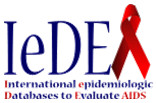Overview
 IeDEA is an international research consortium established in 2006 to provide a rich resource for globally diverse HIV/AIDS data.
IeDEA is an international research consortium established in 2006 to provide a rich resource for globally diverse HIV/AIDS data.
Sites in various regions throughout the world collaborate to collect and define key variables, harmonize data, and implement methodology to pool data as a cost-effective means of generating large data sets to address high-priority research questions and streamline HIV/AIDS research.
IeDEA collects HIV/AIDS data from international regionals: Asia-Pacific ; Caribbean, Central, and South America
; Central Africa
; East Africa
; North America
; Southern Africa
; and West Africa
.
Data and resource pooling allows researchers to address unique and evolving research questions that individual cohorts are unable to answer.
The NICHD Maternal and Pediatric Infectious Disease Branch (MPIDB) co-funds IeDEA, providing support to promote the inclusion of patient data on infants, children, adolescents, and pregnant women. Additionally, IeDEA receives funding from the National Institute of Allergy and Infectious Diseases; National Cancer Institute; National Institute of Mental Health; National Institute on Drug Abuse; National Heart, Lung, and Blood Institute; National Institute on Alcohol Abuse and Alcoholism; National Institute of Diabetes and Digestive and Kidney Diseases; Fogarty International Center, and National Library of Medicine provide funding to IeDEA through a Cooperative Agreement mechanism (U01).
Topic Areas
IeDEA data are collected for pediatric and maternal HIV/AIDS patients treated with antiretroviral therapies. Some research topics using these data include:
- Clinical, viral, and immune response of children with HIV to antiretroviral therapy and children's survival
- Risk factors for disease progression and mortality in children with HIV
- Infectious complications, such as tuberculosis and malaria, in children with HIV
- Types of antiretroviral regimens used in children with HIV in low-resource settings for initial therapy and subsequent treatments
- Development of drug resistance in children receiving antiretroviral therapy
- Complications of therapy among pediatric patients
- Options for monitoring pediatric responses to therapy in low-resource settings
- Psychosocial issues, such as type of caregivers for children with HIV, school issues, and aging into adolescence of youth in low-resource settings who acquired HIV perinatally
- Regimens used for prevention of perinatal transmission and their effects on maternal and child health
- Issues related to program implementation for children, women, and prevention of perinatal transmission
In addition, MPIDB staff is active in the IeDEA Pediatrics , Data Harmonization
, and Tuberculosis and Lung Health
working groups and the IeDEA Executive Committee
. The Pediatrics Working Group has published several cross-regional and global analyses and papers.
NICHD-Funded Data Centers
MPIDB funds pediatric and maternal data collection in the four African regions and from regional centers in the Asia-Pacific region and South America. MPIDB does not fund pediatric data collection in North America because other branch programs support extensive pediatric data collection there. NICHD-funded data centers are as follows:
- Asia-Pacific Research Collaboration
- Caribbean, Central, and South America Network
- Central Africa IeDEA
- IeDEA Southern Africa
- East Africa Regional Consortium
- West Africa Collaboration
More Information
- IeDEA Website
- NICHD Contact: Sonia Lee
 BACK TO TOP
BACK TO TOP